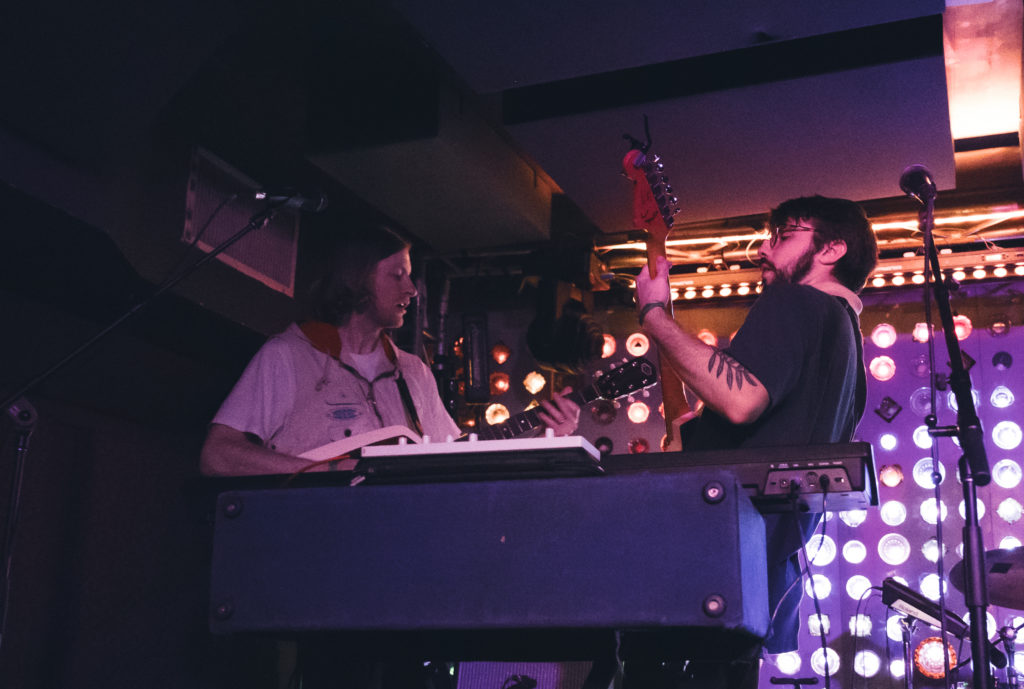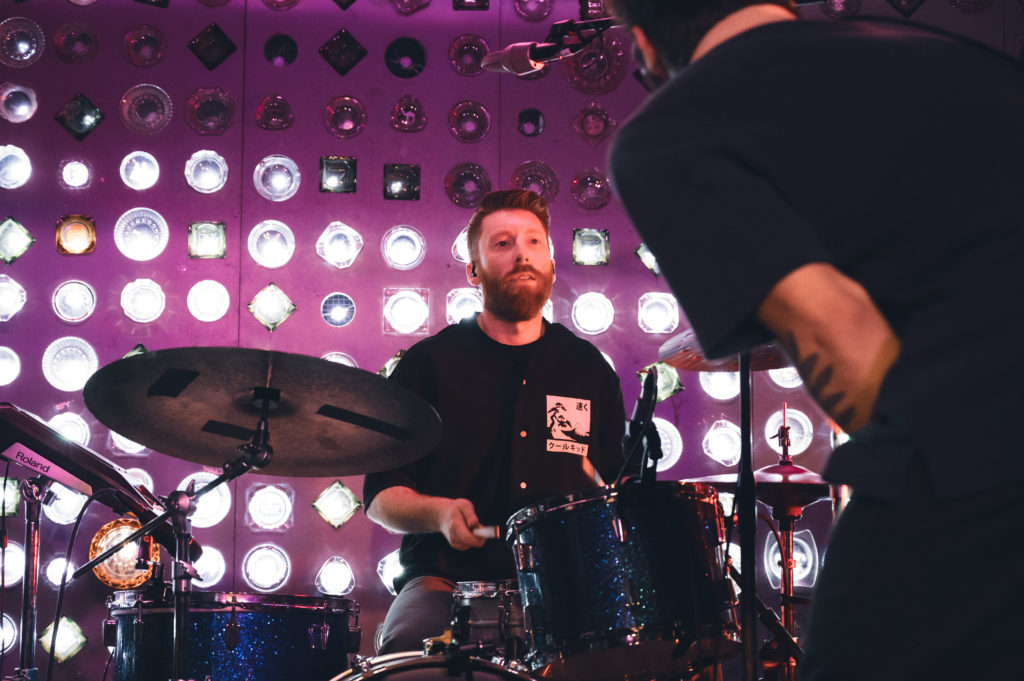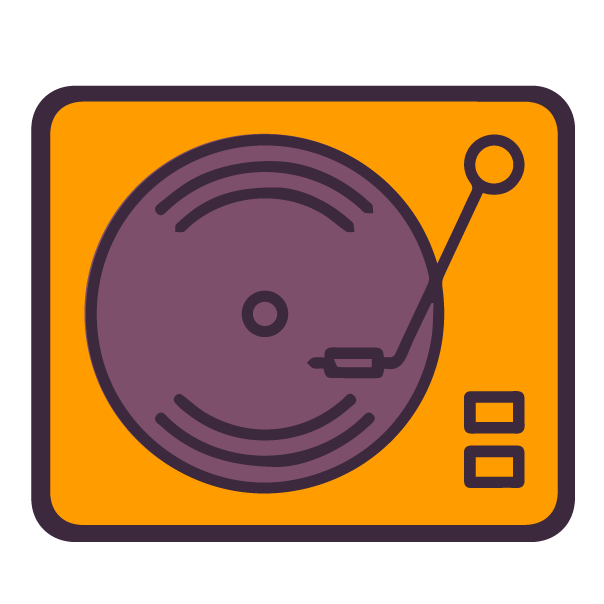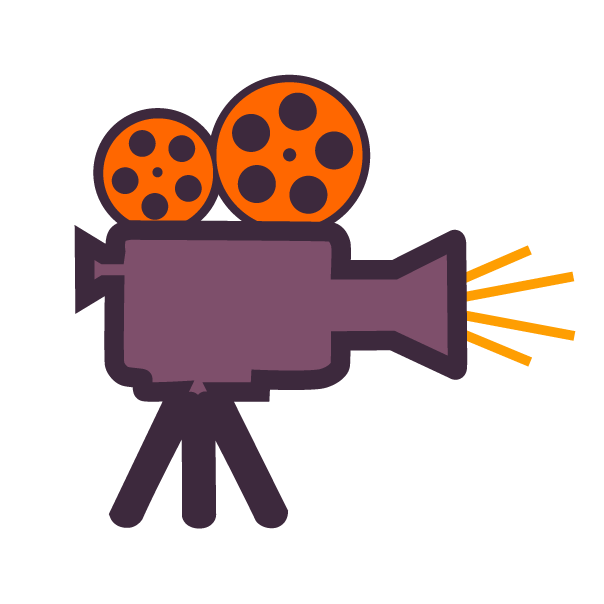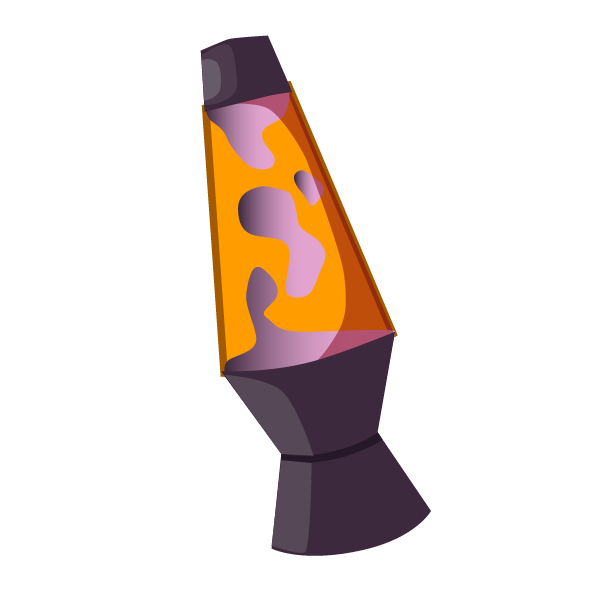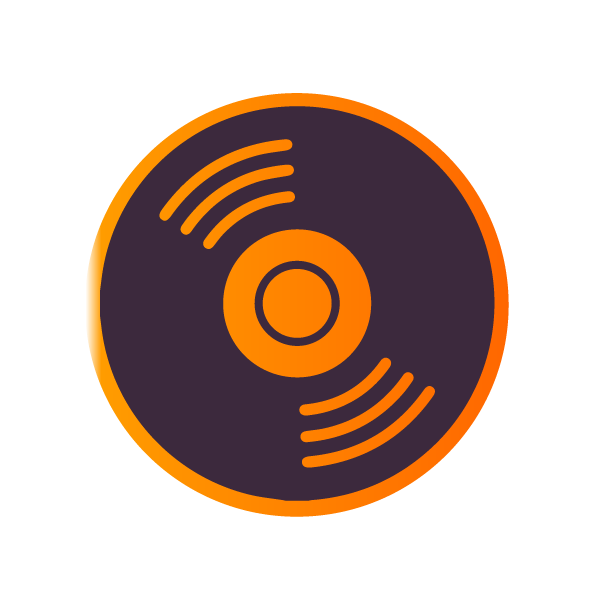By Calli Ferguson | January 18, 2023
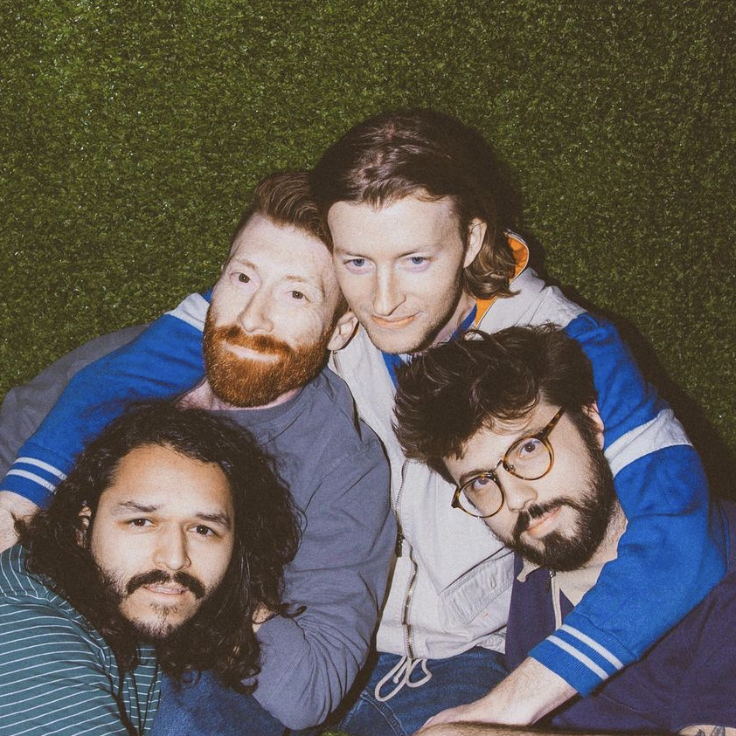
Brother Moses is an indie rock band who wants to make music that people put on when they’re driving in their cars. At least, that’s what the group’s lead singer and guitarist, James Lockhart, told us before their show at Baby’s All Right last week. After the recent release of their latest EP, Apocalypse Football, and on the brink of the upcoming album to follow, Brother Moses kicked off their series of three east coast shows at the Williamsburg venue.
It got us thinking: to be alive in a time where it always kind of feels like the world is ending, it helps to have music that can be with you in the present moment. It helps to go to live shows and have experiences that immerse you in one. That was, very intentionally, the gift Brother Moses gave us with their performance that night.
Before their set, we caught up with James Lockhart (vocals and guitar) and Moses Gomez (guitar) at East River Bar to talk about their story, their latest project, and what’s next for the group and they answered a few questions for the groovement:
How are you guys feeling about playing Baby’s All Right tonight?
Lockhart: It feels pretty cool. Definitely somewhere I’ve wanted to play since we moved here a few years ago. It’s the coolest smaller venue in New York in my opinion. Just a really nice vibe and they care a lot there–the staff is great.
Gomez: It feels like it’s been a long time coming, too.
And you live here in New York?
Lockhart: Yeah, we’re from Arkansas. I live in Greenpoint.
Gomez: I’m right outside of Philly, actually!
Cool! Can you take us back to Arkansas and tell us how the band met?
Lockhart: We’ve known each other since we were kids and we started playing music together when we were kids. We grew up in the same town, went to the same schools, and met in junior high and started playing music together. Then we went to college and met everybody else in our band.
Gomez: Yeah, we just kind of formed after that. We met John Lewis and Corey next. Then we met Lucas, our touring bass player, in Pennsylvania randomly when we were playing a show.
What was your first performance as Brother Moses?
Lockhart: First official Brother Moses performance, I think, was a Battle of the Bands freshman year. And we lost.
Gomez: But the band we lost to was the band that John Lewis was in.
Lockhart: Yeah, John Lewis kind of cheated. He played in two of the bands that beat us. We were like, ‘we gotta get that guy.’ And that’s pretty much how we met him. He was in cooler bands than ours, so we were obsessed with those bands. But bands break up, and then you just kind of… convince them to come over.
Was there a moment where you guys decided you wanted to take this more seriously or continue it out of school?
Gomez: Yeah, I think we were all pretty much done with school at that point. So we thought, “Well, we’ve done all that we can do here in our smaller college town. Where can we go to really do it?” I remember we had this big long conversation. I think there were even PowerPoint presentations. And there were different cities on the table: Seattle, Chicago, stuff like that.
Lockhart: We’d been going on tour in college. We’d go play shows all over to scout cities to try and move to. We just wanted to leave, basically.
Gomez: We were tired of being in the Midwest and just wanted to go somewhere bigger.
When did you decide on New York City?
Lockhart: It was always where we wanted to go, but I think we were just terrified. We were like, oh, that’s gonna be bad. But then we just decided to go for it. Once we decided, it took us like a year and a half to actually do it, because we were still pretty scared and trying to save up money and stuff. But we did it, and it was a lot of fun.
So what was the first New York City venue you played?
Lockhart: The first one that we ever played ever was Rockwood Stage Zero, the room with just the stage and a bar. And then the first one we played after we moved here…I think it was Arlene’s Grocery! We played it with our friend Blake.
Gomez: Yeah! That was a really fun, rowdy show.
Do you guys have favorite venues in New York?
Lockhart: I mean, the Bowery Ballroom really, really impressed me performing at that place. It just feels like they did everything right when they made it. I’ve actually never been to a show there. But [as for venues we haven’t played] I think Rough Trade… rest in peace.
Gomez: Oh Rough Trade! That was a really cool spot.
What’s your dream venue to play in the city?
Lockhart: I mean, all of the big rooms in Manhattan are pretty amazing. I feel like if you can ever say that you played a Brooklyn Steel show or a Webster Hall show…that’s what everybody’s gunning for eventually.
What about if you could play anywhere in the world?
Lockhart: If by some mistake we ever got to do anything at Madison Square Garden… I would just never do anything ever again.
Gomez: I recently saw a Death Cab at The Met in Philly. That is an insane venue. So I’d put that out there.
Do you guys have any pre-show rituals or routines?
Lockhart: That only really happens when we’re on tour and we find something that we like to do. There was one tour where we had an ongoing poker game for three weeks. That was really fun, but we haven’t done it since. You get into a rhythm of something on a specific trip, and then it doesn’t feel the same to try to copy it again. But anytime we’re on a tour, we come up with a word for that day–that we say it before we go on stage–that kind of tries to summarize the day that we’ve had together.
Gomez: Yeah, we have a word or a phrase.
Lockhart: Like if there was a day where something crazy happened at a truck stop and some guy said something crazy…it would be whatever that guy said. And then every day, we add on. So on show 10, there are 10 things you have to remember. It’s good, cause it keeps you sharp before you go on. We have to get our brains working for a second. So tonight, this is not really a tour–we’re playing three shows–but we’ll probably do it. And then on Friday night, we’ll say whatever we said tonight.
We’d love to talk about your new album, Apocalypse Football. Can you tell us a little bit about the process of creating it?
Lockhart: Yeah… it was a mess. We had just finished the whole process of really, seriously writing an album together and releasing it right when Covid hit. We put out the album, and a week later it was Covid time. We were kind of in shell shock for a while. Guys had to move, and we weren’t sure if we could get together in person and if that was like, legal, you know?
We found this software that let us all work on a recording project together remotely. Somebody would make something and upload it to this thing. And then Moses would download it and add stuff. And John Lewis would download and add stuff. It was crazy because somebody would download it and just have complete control over everything. And then they could just change it! That just made everything infinitely more complicated, not being in the same room making decisions at the same time.
Gomez: If you changed anything it’d be a lot of texting, like, “Hey, I changed this part.” You’d put this snippet of what you changed and just send it off to the committee. And then the committee would come back and be like, ‘Aaahhh… no.’ or ‘Yeah, that’s dope.’
Lockhart: Everyone could edit which was not really a good thing, but it was kind of cool. I think the reason the stuff we made is weirder and harder to play live is because of that, and that’s cool! It’s not as typical as what we would have made. I feel like it made us better musicians. But long-story-short is we made way too many songs and there wasn’t a clear album in it. But we realized that there were these six that were all about similar things and sounded like they were in the same world. Because we had stuff that made no sense with the songs we had. We had stuff that was like, weirdly funky.
So for the six that ended up on the record, what was the through line?
Lockhart: I think what we were writing about in the lyrics was so current to the specific time period. And I realized that in more than one song I was making sports references. Which is not something I’d done before. Then, we started to realize they all felt kind of dark. And I think we just really liked the idea of a dark little story.
Gomez: There were two ideas that you had come up with towards the beginning that felt like, oh, yeaaah, we could make something out of this. The end of the world, almost. Once we figured that out, it gave us direction and made us come out with something that I feel is really cohesive.
Correct me if I’m wrong, but contrary to the idea of ‘apocalypse’, your music, to me, sounds optimistic. What would you take from that? Do you think it is a product of your songwriting?
Lockhart: That’s super valid. I think we just can’t help but make pop music at the end of the day. And it’s hard for pop music to be really dark. So I think that happens to us a lot, and it’s okay. I mean I’m definitely on board with making somebody feel good! People call our music ‘surf rock’ or ‘beach rock.’ And I think it’s ‘cause the guitars aren’t super gnarly. So we tried to make them super gnarly.
Gomez: We did what we do, but like… how can we fuck it up a little bit? Turn up the gross meter a little bit.
Is there anything you guys hope for people to take away from your music?
Lockhart: I’ve always just wanted to make stuff with the band that people wanna play in the car. Something people feel comfortable having as a part of their everyday life. That’s part of the appeal of making pop music: you’re trying to make stuff that’s a part of peoples’ lives in an everyday kind of way. It’s not a super visceral, intense experience, but it can be a part of your morning or your evening.
It’s more about trying to express things we want to express and getting excited when something sounds a certain way. It makes you feel what you feel, but then you just put it out there, and whatever anybody else thinks about it is cool no matter what it is.
What do you want people to get from your live shows?
Gomez: We really want people to just jam out! We’ve all been to shows where you’re vibing the whole time which is super fun and super cool. But I think what we try to create is you being a part of the experience as well. Let’s all be in this together.
Lockhart: And just to kind of forget where you’re at and who’s around you. Just forget everything and hang out for an hour.
Do you remember your first concerts?
Lockhart: First of all, you have to remember we grew up in Arkansas. This will inform our answers: I think it was a Christian rock band, Casting Crowns. But these are the shows that come…Like, we’re not even from the cool part of Arkansas! We’re from a very not cool part.
But I remember there was this band who opened for them called Audio Adrenaline. I haven’t listened to them in decades…they might rock. But at the time, I thought they really rocked. So that was pretty inspiring.
Gomez: Mine was… we were at this show together! We were just talking like a month ago about how wild it was that he would even play in this place…But we saw Jason Mraz in Searcy, Arkansas! It was so good. Sick songs. We were in this big auditorium. We were like 15 or something. Best night of our lives. Blown away.
Amazing. And what’s next for you guys?
Lockhart: We’re doing a DC show on Friday and Philadelphia one next Friday. Moses, Corey, and Luke all live out there. So it’s like we get to do our hometown thing and they get to do theirs. Just shaking the rust off at the beginning of the year and celebrating the new EP.
Gomez: We have some other stuff planned in March as well. We’re going to Austin and playing South By Southwest.
——
Just a couple hours later (and after an electric performance from opener, Big Dumb Baby) Brother Moses came on stage to a full crowd late on a Wednesday night. Their friendly, playful dynamic sucked us right in, making the idea of forgetting where we were and being in the moment a little easier.
“This is about missing the damn train,” Lockhart said, as he introduced the song, “What Does it Take?.” “Your whole life’s ahead of you, friends. But for now, it’s okay to get down.” And immediately, we were reminded of what the musician said about making music that can be with us in our everyday life. Of course, we need music for all of the extremes; in a lot of ways, it’s why we love music. But we also need music for the in-betweens, the “everyday,” the random moments…when the world happens to feel like it’s ending…when we feel so human.
Connect with Brother Moses on Instagram, Spotify and their website.

📸: shot by Jori Halpern
